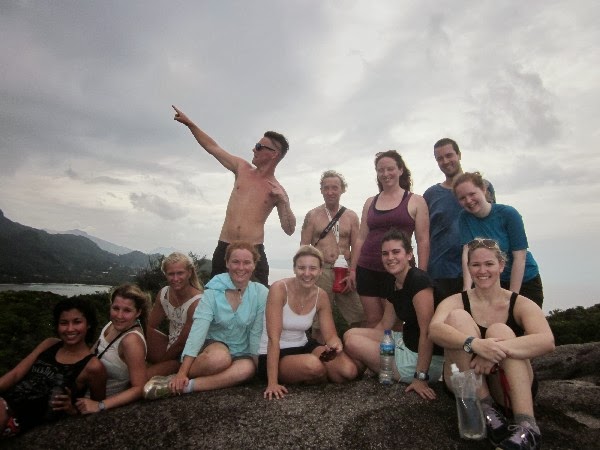As 22 new
volunteers who just arrived a week ago, nothing we could have imagined could have prepared us for
life on base.
Our days since
we arrived have been jam-packed full of new knowledge and life skills with
barely a moment to think. Many countries are represented on this trip:
Scottish, English, German, Danish, Swedish, Swiss, Belgian, American, Canadian
and Australian. The on-site banter currently involves mercilessly assailing
every national stereotype one could imagine, which is pretty amusing (and
scarily accurate!).
A typical day at Cap Ternay starts off with an early wake up call, generally about 6 (5 if
you’re really unlucky) before starting duties at 6:15. There is a rotation of 4
duties that everyone does: Kitchen, Tanks, Grounds and Boats.
Kitchen involves
cooking every meal, catering for 30 people. Staples include a diet of mostly
beans, vegetables and fruit.
Learning how to fill tanks and properly measure the amount of air they
contain is really interesting, while grounds includes keeping the common areas
and toilets spick and span for the other volunteers. Boat usually involves a
(very) early rise to help load the pickup with the necessary gear every dive
requires, for further loading onto the boat: this kit contains emergency
oxygen, surface marker buoys (SMB), weights, personal flotation devices (PFDs).
At the moment we
have been running through all our check dives, including basic skills, buoyancy
control, navigation and basic instruction in species identification. Buoyancy
control involved us spending most of the dive floating up and down in the water
column with our faces in the sand. Navigation required a bit of on land
training prior to hitting the water. To the outside world, 30 people walking
around the yard with towels on their heads, bumping into things, would have
been rather amusing! This was all in preparation for our attempt to swim in a
square under water, easier said than done.
Next week, once everyone has proved
their abilities in the water, and those without Advanced Open Water tickets
have achieved them, the real fun begins with fish, coral and invertebrate spots
which everyone is frantically studying in advance of our knowledge exams.
Base
orientations have been enjoyable and teach a basic level of life and
subsistence skills, for example breadmaking, fruit identification and
collection, cinnamon harvesting, machete training, coconut husking and
preparation, and drinking.
Some intrepid
volunteers have already reached the summit of Cap Matoopa on a hike which
involved slashing through jungle, Predator style, and scaling rocks before being
greeted with a stunning panoramic view of the bay. Some other less intrepid
explorers decided to catch up on some shuteye...
The weather is
changeable at the moment with lots of heavy, yet warm, downpours during the day
and at night. Four seasons in one day is not wrong! From the boat the views of
the sea and the surrounding lands and beaches is really stunning and makes it
all worthwhile.
Even though
we’ve only hit the water a few times, the underwater world is spectacular. So
far we have been graced by moray eels, sea turtles, eagle rays breaching out of
the water, inquisitive spade fish (bat fish), defensive mud crabs (they’re
really quite chicken), many varieties of butterfly and angelfish all of which
we can definitely identify already. At low tide, we trudge our way out to the
boat, through knee deep water across a seagrass and sand bed of cucumbers and
razor clams but once at the dive sites we descend on a beautiful coral garden
of immenseness, tranquil, colourful and incredibly peaceful.
By comparison,
the wild life on land is equally as diverse. Between the screeching bats and
the barking gekkos we also have an abundance of snails, frogs, feral cats and
tigers (just kidding). Oh, and the mosquitoes!
That’s all for
now, stay tuned for next week’s crazy adventures!
Martin & Connie

19/1/2014: Cap T - Week 1: Life on Base


























